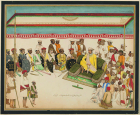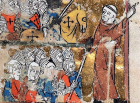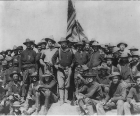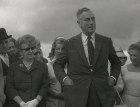International Relations
Relations across the UK, Europe and globally are frequently changing, and have done so across our history. How these relations are recorded, monitored and treated are discussed in the collection of articles and podcasts here. The very concept of international relations is explored as are when boundaries and discussions between states and groups started to matter. What are the procedures, protocols and outcomes of a world according to the history of international relations are all under scrutiny?
Sort by:
Date (Newest first) | Title A-Z
Show:
All |
Articles |
Podcasts |
Multipage Articles
-

Recruiting volunteers to fight in the First World War
ArticleClick to view -

Film: Lenin, the 1905 Russian Revolution and WWI
ArticleClick to view -

Films: Khrushchev – Interpretations
9th October 2024Click to view -

Film: Khrushchev - Background
ArticleClick to view -

Political and social attitudes underpinning the 1924 Olympics
ArticleClick to view -

Real Lives: Maharaja’s German: Anthony Pohlmann in India
ArticleClick to view -

Bonapartism after Napoleon III: the Prince Imperial and Eugene Loudun
ArticleClick to view -

The Legacy of the Z Special Unit in World War II
ArticleClick to view -

The United Nations Convention on the Prevention and Punishment of the Crime of Genocide
ArticleClick to view -

Doomed to fail: America’s intervention in Vietnam
ArticleClick to view -

History Abridged: American Policy: theory and practice over 200 years
ArticleClick to view -

Anti-Americanism in Britain during the Second World War
ArticleClick to view -

The First Crusade, 1095–99
ArticleClick to view -

Berlin and the Berlin Wall: on-demand short course
Multipage ArticleClick to view -

Film series: Power and authority in Germany, 1871-1991
ArticleClick to view -

The Spanish-American War revisited: rise of an American empire?
ArticleClick to view -

Evelyn Waugh’s books on the Italo-Ethiopian War, 1935–36
ArticleClick to view -

My great-grandfather and the Italian Campaign
ArticleClick to view -

The rise and fall of Nauru
ArticleClick to view -

Mountbatten in retirement: the abortive trip to rebel Rhodesia
ArticleClick to view

